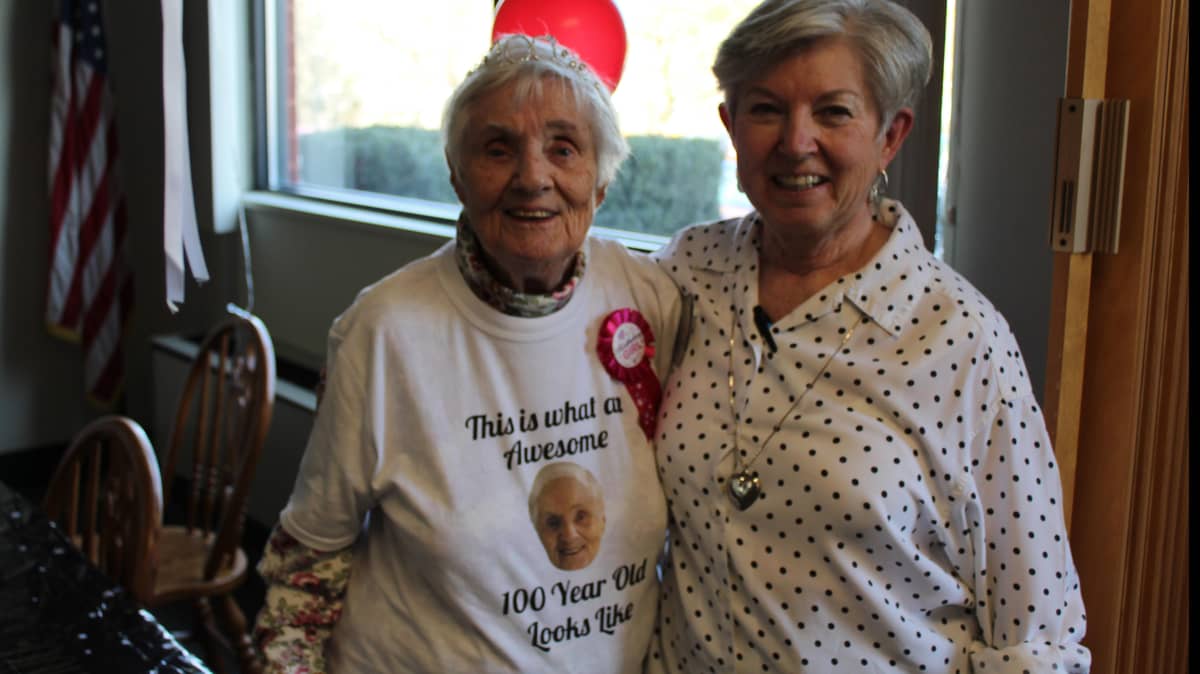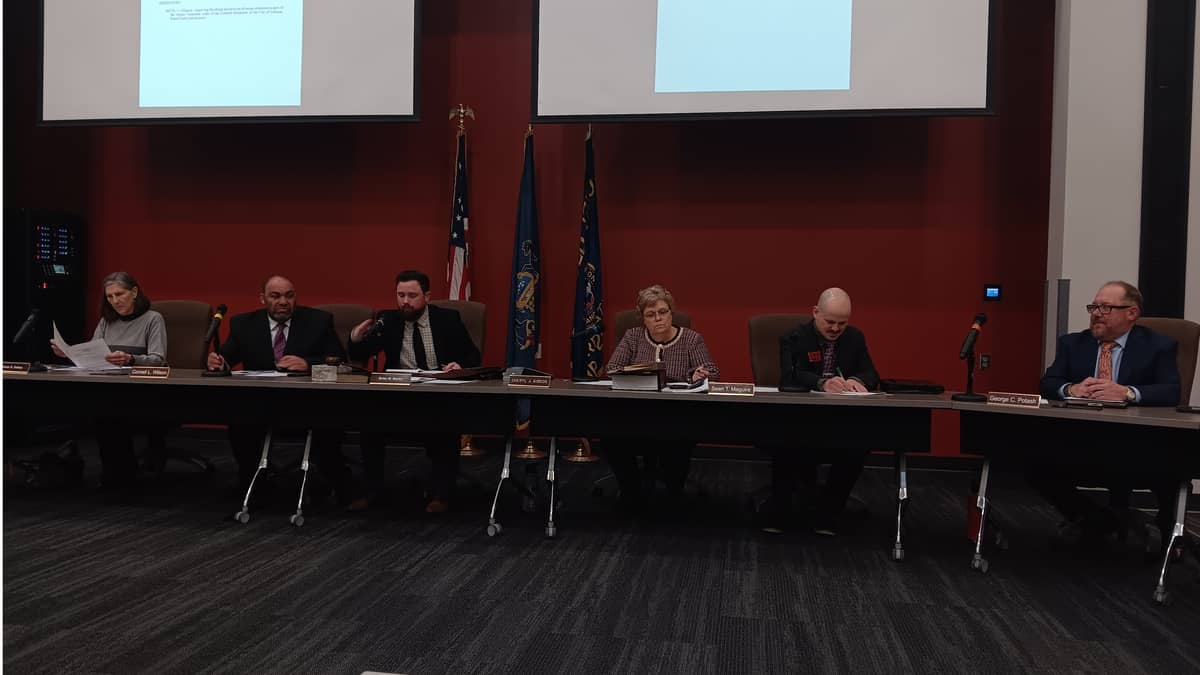It’s not what happens to you, it’s how you handle it.
You’ve lived 100 years, through the Roaring Twenties, a great depression, three wars, men on the moon, and into the internet age.
Along the way, you were raised by a single mom who lost two of her six children—your sisters—when they were young.
You grew up in a home without central heating. When epidemics rolled through, there were quarantine signs on houses up and down the street.
You pretty much had to walk everywhere, because hardly anybody had a car.
When you had a nickel for the trolley to take you to the Casino Roller Rink, you had to decide if you were walking on the way out or the way back, because round trip fare was a dime.
You had to quit school at 16 to take a factory job, because your family needed the income.
You saw your husband go off to war, leaving you and your eight month old daughter behind.
It wasn’t until you were 23 that you got your first telephone, and then only because having a husband fighting overseas moved you to the head of the line.
Your husband made it home alive and well, but died when he was 50.
Looking back on all that, a lot of us might say that was a pretty hard, sometimes miserable, life, right?
Irene Wike doesn’t think so. She says she’s had, and is still having, such a good life that she danced at her 100th birthday party last month. And told the piano player to come back and play at her 105th.
We interviewed her at Poplar Terrace, where she’s lived for 22 years. At several points she apologized for joking around and not taking our conversation seriously enough.
Irene Wike has nothing to apologize for.
She was born at home in Avon on April 7, 1921. “In those days, they had them at the house,” she said. Her parents had six children, but two sisters, Gracie and Catherine, “died very young.”
Her father was a trolley driver in Lebanon, but her parents separated before she was old enough to understand. “They left each other when I was a kid. I didn’t know my dad.”
Read More: Before World War II, trolley cars were the best way to get around Lebanon City
Wike was seven when her mother took her and her three brothers to live in Lebanon, first on North 12th Street, then to a house near 5th and New Streets. Whooping cough quarantine signs dotting neighborhood front doors meant no one could leave or enter. No visitors, no church, no school.
Wike remembers a house without central heat. It had a coal-fired cook stove and oven, with a “water jacket” on the side that doubled as the water heater. “We didn’t even have a furnace, we had a Heatrola,” a single room space heater.
But her house was like the others in her north side neighborhood and, decades later, she has no complaints about growing up in it.
Wike remembers the great depression. “We kids had to work. I used to babysit,” she said, “and we’d all pick dandelions in the spring and sell them in nickel bags.”
But she also had a lot of fun as a kid. She took piano lessons and remembers playing “Bringing in the Sheaves.” Her brother had the only bicycle in the family, because he had a paper route, but he let Irene and her sisters learn to ride on it.
And there were four theaters in Lebanon when she was growing up. She rattled off their names as if they were still open: Colonial, Jackson, Capitol, and Academy. Wike loved watching Zeigfield Follies movies on the big screen.
Roller skating at the Casino and ice skating on the pond next to the old brewery on North 7th Street were two of her favorite activities.
Wike attended elementary school at Lindley Murray, and went on to what is now Harding Elementary, which was then a combined junior and senior high school.
Her school days ended in 1937. “I quit school at 16 and went to work to help my mom.” “Work” was the Wise Shirt factory at Lehman and New Streets. She stayed at Wise until it closed, then spent her last few working years at Demford Manufacturing on North 7th Street.
During her working years she married her husband, James (“we were neighbor kids”), had their only child, Karen Meiner, and voted in her first election, for Franklin D. Roosevelt.
The only interruption of her factory jobs was two weeks during World War II inspecting airplane parts at Lebanon’s Bethlehem Steel plant. She would have stayed longer, but had to leave when she learned she was pregnant.
Like almost every American who was a young adult in the 1940s, World War II is a major landmark in Wike’s life. That was when, like her mother before her, she became a single parent, but only until the war ended.
“My daughter was eight months old and my husband had to go to war,” she said. “He was drafted (in 1944). He didn’t enlist because we just had a little girl.” Even with no husband and a baby to care for, she kept working at Wise Shirt.
Having a husband fighting in France was hard, but it had an unexpected benefit. “That’s when I got the telephone,” Wike said. “It was hard to get a phone. When I went to 8th & Chestnut (then the Bell Telephone office), I had my daughter with me,” she recalled.
The phone company clerk asked Wike if that was her little girl she was holding. “I said ‘yes, my husband’s in the service overseas’, and she said ‘then you can get a phone.'”
Wike’s husband got back from France safe and sound, and worked at Quaker Alloy in Myerstown. In 1971, he died of a heart attack at age 50.
Demford Manufacturing closed in 1983 and, at 62, Wike decided it was time to retire. “I retired because I was tired, and I’m still tired,” she joked.
Retirement didn’t keep Wike from enjoying herself. She never forgot listening to Hawaiian music on the family radio as a little girl. “Oh, I loved that music! It was so smooth, and I said ‘I got to get there!'” And years later “I got there. We saw the Arizona when we took a boat ride around Pearl Harbor.”
She’s also traveled to the Grand Ole Opry, Niagara Falls, Maine, Carlsbad Caverns, and to New York City, where she caught the Rockettes at Radio City Music Hall.
And Wike plans to keep active and curious into her second century. Although her eyesight isn’t what it once was, she watches TV and reads her Kindle.
No interview of anybody who has made it to 100 would be complete without asking the dumb question “what’s your secret for living so long?” Wike probably thought it was dumb when we asked her, but she didn’t hesitate.
“It’s God’s will, but I was always active, I didn’t sit around. I think that helped. You have to keep good spirits and keep the parts moving and the blood flowing.”
Irene Wike has had some hard times and some dark days, but it’s hard to get her to talk about anything but her good memories. Keep moving, don’t feel sorry for yourself, do what needs to be done, have some fun.
It’s not what happens to you, it’s how you handle it.
Questions about this story? Suggestions for a future LebTown article? Reach our newsroom using this contact form and we’ll do our best to get back to you.

Build the future of local news.
Cancel anytime.
Monthly Subscription
🌟 Annual Subscription
- Still no paywall!
- Fewer ads
- Exclusive events and emails
- All monthly benefits
- Most popular option
- Make a bigger impact
Already a member? Log in here to hide these messages
Quality local news takes time and resources. While LebTown is free to read, we rely on reader support to sustain our in-depth coverage of Lebanon County. Become a monthly or annual member to help us expand our reporting, or support our work with a one-time contribution. Cancel anytime.

























